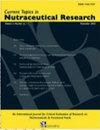灵归竹肝汤通过激活核因子-红细胞因子2相关因子2/抗氧化反应元件信号通路减轻阿尔茨海默病的认知缺陷
IF 0.4
4区 医学
Q4 NUTRITION & DIETETICS
引用次数: 0
摘要
阿尔茨海默病是一种常见的神经退行性疾病。苓桂柱肝汤具有抗炎、抗肿瘤、调节免疫等作用,是健脾益水的代表性药物。本研究旨在探讨灵桂竹肝汤减轻阿尔茨海默病的作用机制。将SH-SY5Y细胞暴露于β-淀粉样蛋白1-42中,并将β-淀粉样蛋白1-42注射到Sprague-Dawley大鼠体内,构建体外和体内阿尔茨海默病模型。Morris水迷宫试验用于评估大鼠的认知能力下降。采用细胞计数试剂盒-8、流式细胞术分析和酶联免疫吸附法测定细胞活力、凋亡和炎症。β-淀粉样蛋白1-42处理可诱导SH-SY5Y细胞凋亡,引起炎症反应和氧化应激,同时抑制细胞增殖。苓归珠甘汤通过激活核因子红系2相关因子2/抗氧化反应元件信号通路,拮抗β-淀粉样蛋白1-42对SH-SY5Y细胞的影响。此外,灵桂朱肝汤通过上调核因子-红系2相关因子- 2/抗氧化反应元件通路,以剂量依赖的方式改善阿尔茨海默病大鼠的记忆和学习能力,减轻神经病变、炎症反应和神经毒性。灵桂助肝汤通过上调核因子红系2相关因子2/抗氧化反应元件信号通路,抵消机体氧化应激水平失衡和神经炎症引起的损伤,提高阿尔茨海默病大鼠的空间学习记忆能力。本文章由计算机程序翻译,如有差异,请以英文原文为准。
Ling-Gui-Zhu-Gan Decoction Alleviates Cognitive Deficits in Alzheimer’s Disease by Activating the Nuclear Factor-Erythroid Factor 2-Related Factor 2/The Antioxidant Responsive Element Signaling Pathway
Alzheimer’s disease is a common neurodegenerative disorder. Ling-Gui-Zhu-Gan decoction has anti-inflammatory, anti-tumor, and immune-regulating effects and is a representative agent for strengthening the spleen and promoting water retention. The present study aimed to investigate the underlying mechanism of Ling-Gui-Zhu-Gan decoction in alleviating Alzheimer’s disease. Alzheimer’s disease in vitro and in vivo models were constructed by exposing SH-SY5Y cells to β-amyloid 1-42 and injecting β-amyloid 1-42 into Sprague-Dawley rats, respectively. The Morris water maze test was used to assess cognitive decline in rats. Cell counting kit-8, flow cytometry analysis, and enzyme-linked immunosorbent assay were conducted to determine cell viability, apoptosis, and inflammation. β-amyloid 1-42 treatment induced SH-SY5Y cell apoptosis, evoked inflammation response and oxidative stress while hindering cell proliferation. Ling-Gui-Zhu-Gan decoction antagonized the effect of β-amyloid 1-42 on SH-SY5Y cells by activating the nuclear factor erythroid 2-related factor 2/antioxidant response element signaling pathway. In addition, Ling-Gui-Zhu-Gan decoction improved memory and learning abilities and alleviated neuropathologic lesions, inflammation response, and neurotoxicity in Alzheimer’s disease rats in a dose-dependent manner by upregulating nuclear factor erythroid 2-related factor 2/antioxidant response element pathway. The Ling-Gui-Zhu-Gan decoction improved the spatial learning and memory ability of Alzheimer’s disease rats by upregulating the nuclear factor erythroid 2-related factor 2/antioxidant response element signaling pathway to counteract the imbalance in the body’s oxidative stress levels and the damage caused by neuroinflammation.
求助全文
通过发布文献求助,成功后即可免费获取论文全文。
去求助
来源期刊
CiteScore
1.10
自引率
0.00%
发文量
36
审稿时长
>12 weeks
期刊介绍:
Current Topics in Nutraceutical Research is an international, interdisciplinary broad-based peer reviewed scientific journal for critical evaluation of research on chemistry, biology and therapeutic applications of nutraceuticals and functional foods. The major goal of this journal is to provide peer reviewed unbiased scientific data to the decision makers in the nutraceutical and food industry to help make informed choices about development of new products.
To this end, the journal will publish two types of review articles. First, a review of preclinical research data coming largely from animal, cell culture and other experimental models. Such data will provide basis for future product development and/or human research initiatives. Second, a critical evaluation of current human experimental data to help market and deliver the product for medically proven use. This journal will also serve as a forum for nutritionists, internists, neurologists, psychiatrists, and all those interested in preventive medicine.
The common denominator of all of the topic to be covered by the journal must include nutraceuticals and/functional food. The following is an example of some specific areas that may be of interest to the journal. i) Role of vitamins, minerals, antioxidants and phytonutrients on cardiovascular health, cancer, diabetes, ocular health, mental health, men’s health, women’s health, infant nutrition, ii) Role of herbals on human health, iii) Dietary supplements and sleep, iv) Components of diet that may have beneficial effect on human health, v) regulation of apoptosis and cell viability, vi) Isolation and characterization of bioactive components from functional foods, vii) Nutritional genomics, and viii) Nutritional proteomics.

 求助内容:
求助内容: 应助结果提醒方式:
应助结果提醒方式:


